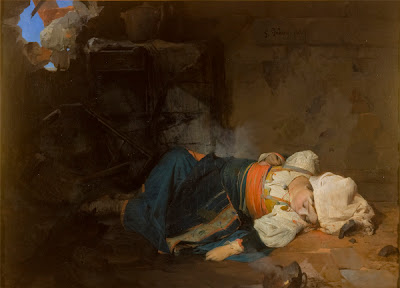By Primo Levi, because nothing you forget
Felix Nussbaum, Autoportrait
La tregua
dreams in the night ferocious
Dreams dense and violent
dream body and soul:
back, eat, tell.
until it sounds about low
command dawn:
\u0026lt;>;
It broke my heart in my chest.
Now we have found Home,
our belly is full,
we finished telling.
is time. Soon we will hear more
foreign command:
\u0026lt;>;
;
January 11, 1946
Primo Levi
[...] It was precisely the hardships, beatings, cold, thirst, that kept us afloat in the void of bottomless despair, during and after your trip. Not the will to live, nor a conscious resignation, because few men are capable of this, and we were not a common standard of humanity.
The doors were closed immediately, but the train did not move that night. We learned our destination with relief, Auschwitz: a name without meaning, then for us, but he had to correspond to a place of this earth.
The train was traveling slowly, with long stops unnerving. From the Louvre, we saw high rocks to slip off the pale of the Adige valley, the last names of Italian cities. Brenner spent the second day of the twelve, and all rose to their feet, but no one said a word. I was in my heart the thought of return, and cruelly I might have been represented as the joy of that other inhuman landscape, open door that no one would want escape, and the first Italian names ... and I looked around, and I thought those among the poor human dust, would have been touched by destiny.
forty-five Among the people in my car, only four have reviewed their homes, and it was by far the most successful coach.
We suffered from thirst and cold all the stops to ask for water with a loud voice, or at least a handful of snow, but we were rarely heard, the soldiers of the escort away those who tried to approach the convoy. Two young mothers with children still breastfeeding, night and day groaning begging water. Were less agonizing for all the hunger, fatigue and insomnia, made less painful by the tension of the nerves, but the nights were nightmares without end. [...]
Next to me, as I bolted between body and body, the whole trip was a woman. We had known for many years, and misfortune we had grown together, but knew little about each other.
We said then, at the hour of decision, things that are said to among the living. We said goodbye, and it was short, each greeted the other life. We had no more fear. [...]
We also know that although this is not always tenuous principle of discrimination on disabled people and disabled was followed, and then adopted was often the easiest way to open both doors of the wagons, without warnings or instructions to newcomers. Those entered in the field that the case was down on one side of the train, went to the other gas.
Thus died Emilia, who had three years to the Germans appeared to clear the historical necessity of killing the children of the Jews. Emilia, daughter of engineer Aldo Levi of Milan, which was a little curious, ambitious, funny and intelligent, which, while traveling in the car packed, the father and mother had managed to bathe in a tub of zinc, in warm water that the German driver had consented to degenerate to tap the locomotive that drags us all to death.
Thus, in an instant, a betrayal, our women, our parents, our children. [...]
(by Primo Levi, The trip )
Not to forget
If this is a man
You who live safe
In your warm houses,
You who find, returning in the evening
Hot food and friendly faces
Consider if this is a man
What works in the mud
Who knows no peace
Who fights for a bread
Who dies for a yes or a no.
Consider if this is a woman,
Without hair and unnamed
Without more strength to remember
eyes empty and her womb cold
Like a frog in winter.
forget that this was:
Remember these words.
Engrave in your heart
When at home because,
bed, rising;
Repeat them to your children.
O there undone the house,
illness impede you,
May your children twist their faces from you.
; ; Primo Levi
Primo Levi (1919-1987) was born in Turin by the Jewish family. Interned in camps of Auschwitz, he survived and he recalled that experience and the successful return home in his books: If this is a man (1947) and The Truce (1963). Committed suicide in 1987.
You can not read these verses, these words, these pages, without losing feel, without feeling the need to cover her face to the horror of what was and what could happen again, because Auschwitz is still lurking.
Reading, custodian of our memory, is a filter pausativo to learn, remember, confront and work to prevent such monstrosities come back, because "the sleep of reason can still generate monsters." (AL)
Anna Lanzetta





















